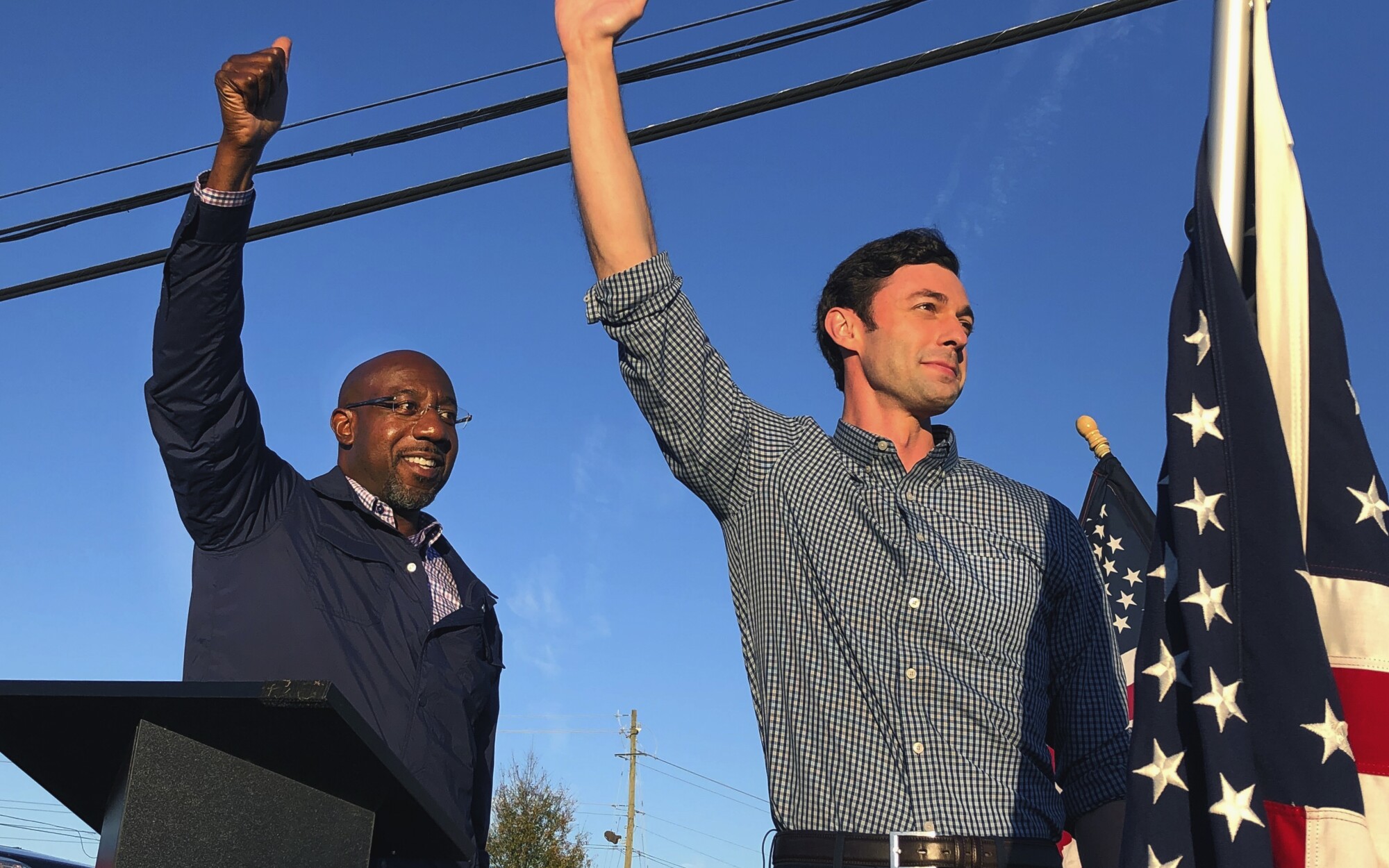 Listen HERE
Listen HERE
This week, as the UK began vaccinating people against Covid 19, we consider proposals here in the US to establish a coronavirus commission, empowered to investigate the many failures in the fight against the virus: Mike Davis says that is something progressives should fight for—and insist on subpoena powers.
Also: Will Donald Trump pardon Ivanka and Jared—and Don Junior and Eric? What exactly are their crimes? It sounds like it’s time for another episode of The Children’s Hour—with Amy Wilentz. 12-9-2020
Start Making Sense
How the Democrats can Win Georgia: Joan Walsh, plus David Cole on the Supreme Court and Trump’s Reapportionment Plan
 Listen HERE
Listen HERE
Georgia is the center of the political universe right now. On January 5, Georgia votes for two senators, a runoff election that will determine which party controls the Senate and thus the fate of any Democratic initiatives after Joe Biden becomes president on January 20. Joan Walsh comments on the campaigns of Jon Ossoff and the Rev. Raphael Warnock as they challenge incumbent Republicans Kelley Loeffler and David Purdue—and on Trump, who once again is eager to make it all about himself.
Also: On Monday the Supreme Court heard arguments on Trump’s effort to change the way seats in the House of Representatives are apportioned. It has been based on a state’s total population, as the Constitution requires; he wants to exclude the undocumented, which would mean California would lose or two or three seats. David Cole reviews the arguments—he’s The Nation’s legal affairs correspondent and national legal director of the ACLU. 12-3-2020
Stacey Abrams: The Fight for Georgia; plus Amy Wilentz: Who is Lara Trump?
 Listen HERE
Listen HERE
All eyes are on Georgia now, as the campaigns for both senate seats are underway to determine which party will control the US Senate. For Democrats, the starting point for winning in Georgia is the historic work of Stacey Abrams. When she ran for governor of Georgia in 2018 as the first African American and the first woman candidate, she got more votes than any Democrat in Georgia history, including Obama and Hillary Clinton. But because of Republican vote suppression she was not elected. Nevertheless she paved the way for Biden to win the state—a historic victory. We spoke with her in April 2019, about how she built the coalition that now hopes to win two senate seats in January.
Also: How are the Trump kids dealing with the refusal of their father to admit he lost the election? Amy Wilentz comments—on another episode of The Children’s Hour, stories about Ivanka, Don Junior, Little Eric—and Lara. 11-25-20
Covid-19 vaccines: Why does Big Pharma get to keep all the profits? Gregg Gonsalves, plus J. Hoberman on ‘The Chicago 7’
 Listen HERE
Listen HERE
Monday we had good news on a Covid vaccine from Moderna, created with a billion dollars of taxpayer funding. Gregg Gonsalves takes up the question, Why does Big Pharma get to keep all the profits? Also: Why Mitch McConnell is a bigger threat to Americans than the virus.
Plus: The legendary film critic for the late, lamented Village Voice, J. Hoberman, talks about Aaron Sorkin’s new film, playing now on Netflix, The Trial of the Chicago 7. He asks the question, “is it great courtroom drama—or boomer porn?” 11-18-2020
Mike Davis: Biden’s Big Mistake; Black Lives Matter-Victories at the Polls: Jody Armour
 Listen HERE
Listen HERE
Mike Davis on the Trump voters: Latinos in south Texas and white workers in the rust belt—and Biden’s big mistake: allowing Trump to claim “the economy” as his issue, instead of connecting jobs to controlling the pandemic.
Also: Black Lives Matter had massive victories in the elections in America’s biggest county—LA, with 10 million people. They elected a progressive D.A. and passed an initiative to re-imagine public safety by moving 10 per cent of the county’s $5 billion unrestricted budget to alternatives to incarceration, to community services, and barring the county from using the money on prisons, jails ,or law enforcement agencies. Jody Armour explains—his new book is N*gga Theory: Race, Language, Unequal Justice, and the Law. 11-12-2020
Biden’s Successes—and Trump’s: John Nichols and Joan Walsh
 Listen HERE
Listen HERE
John Nichols says Joe Biden seems to be headed for a historic win. On Wednesday afternoon he already had more than 70 million votes—the largest number of votes for a president in American history. He’s also above 50 per cent, something no Democrat has done in our lifetimes, except for Barack Obama. So this is likely to be a big victory, except for one thing: The Electoral College. That’s where it’s close, and that’s our problem.
Joan Walsh looks at Trump’s support, and finds it shocking that he did about as well as last time, despite everything that he’s done in the last four years, culminating in the disaster of the pandemic response and the highest unemployment rate since the Great Depression. She concludes that too much of our country consists of racists who prefer white supremacy to equality. 11-4-20
The Politics of White Men, from Obama to Trump: Melissa Harris-Perry and Dorian Warren, plus Sherrod Brown on voting and Eric Foner on disputed elections
 Listen HERE
Listen HERE
Melissa Harris-Perry and Dorian Warren talk about the changing voter turnout among white men and people of color over the last three presidential elections—and other features of our political system. They are hosting a new podcast for The Nation, “System Check”—checking the systems that hold us back: premiering Friday at TheNation.com, Apple podcasts, and elsewhere.
Also: talking politics, and history, with Sherrod Brown. Of course he’s the senior senator from Ohio, first elected in 2006. He was re-elected in 2018—he won by 7 points—in a state Hillary Clinton had lost—by 8 points—just 2 years earlier. He talks about how he did that, and how Biden has learned the lessons of that campaign.
Plus: disputed elections past and present: Maybe the election next week will have a big enough vote for Biden so that it can’t be challenged in court; maybe the Republicans won’t dispute the outcome. But maybe they will. We’ve had other disputed elections in our history—of course we had the Supreme Court stopping the count in Florida in 2000; and there was another one, much less well known—the election of 1876. Historian Eric Foner explains. 10-28-20
Mike Davis: Climate Change, Extreme Fires, and White Flight plus Rennie Davis on ‘The Trial of the Chicago 7′
 Listen HERE
Listen HERE
Mike Davis argues that climate change is bringing “extinction events” to native land cover around the world. Extreme fires are one of the main forces bringing this apocalypse—spurred in places like California by white flight among Trump supporters to high-fire-danger areas.
Also: The new Aaron Sorkin film, Trial of the Chicago 7, opened on Netflix this past weekend. Of course it’s about the 1969 trial of leaders of the antiwar movement, including Tom Hayden, Abbie Hoffman, Jerry Rubin, and Rennie Davis—and we have Rennie Davis as a guest. He was the New Left’s most talented organizer, and he talks about the film and the real history of those protests—and also politics today. 10-21-20
Can ‘herd immunity’ lead to ‘re-opening America’? Gregg Gonsalves on Covid-19, plus Allissa Richardson on Black Cell-Phone Videos
 Listen HERE
Listen HERE
A group of scientists are calling it “The Great Barrington declaration”—a strategy to deal with the Covid-19 pandemic by age-targeted reopening. The advocates call it “focused protection”; they say it would create herd immunity. Gregg Gonsalves argues that it will not—and that “we can do better.”
Also: Cell-phone videos of police killing Black people have had an immense political impact over the last couple of years. Allissa Richardson comments on the videos and the new Black protest journalism, based largely on Twitter. Her new book is Bearing Witness While Black: African Americans, Smartphones, and the New Protest #Journalism. 10-14-20
Trump Gets the Best Medical Care While Working to End Healthcare for Tens of Millions: Amy Wilentz on Covid-19, plus Ari Berman on Voting Rights
 Listen HERE
Listen HERE
When Trump left Walter Reed hospital, he tweeted “don’t be afraid of Covid-19.” Amy Wilentz disagrees, and argues that, while the president got the best medical care in the world—which we would want for any president—at the same time he’s trying to abolish Obamacare, which provides healthcare for tens of millions of Americans.
Also: Ari Berman talks about voting rights and voter suppression, about the voter protection efforts of the Biden campaign and the Democratic Party, and about recent Supreme Court decisions on voting rights cases. 10-7-2020
